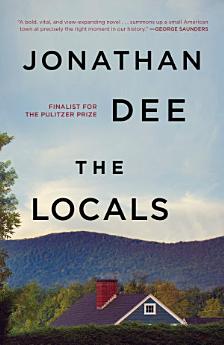The Locals: A Novel
សីហា 2017 · Random House
5.0star
ការវាយតម្លៃ 1report
សៀវភៅអេឡិចត្រូនិច
416
ទំព័រ
family_home
មានសិទ្ធិ
info
reportការវាយតម្លៃ និងមតិវាយតម្លៃមិនត្រូវបានផ្ទៀងផ្ទាត់ទេ ស្វែងយល់បន្ថែម
អំពីសៀវភៅអេឡិចត្រូនិកនេះ
“Summons up a small American town at precisely the right moment in our history . . . a bold, vital, and view-expanding novel.”—George Saunders
A rural working-class New England town elects as its mayor a New York hedge fund millionaire in this inspired novel for our times—fiction in the tradition of Jonathan Franzen and Jennifer Egan.
A WASHINGTON POST NOTABLE BOOK
Mark Firth is a contractor and home restorer in Howland, Massachusetts, who feels opportunity passing his family by. After being swindled by a financial advisor, what future can Mark promise his wife, Karen, and their young daughter, Haley? He finds himself envying the wealthy weekenders in his community whose houses sit empty all winter.
Philip Hadi used to be one of these people. But in the nervous days after 9/11 he flees New York and hires Mark to turn his Howland home into a year-round “secure location” from which he can manage billions of dollars of other people’s money. The collision of these two men’s very different worlds—rural vs. urban, middle class vs. wealthy—is the engine of Jonathan Dee’s powerful new novel.
Inspired by Hadi, Mark looks around for a surefire investment: the mid-decade housing boom. Over Karen’s objections, and teaming up with his troubled brother, Gerry, Mark starts buying up local property with cheap debt. Then the town’s first selectman dies suddenly, and Hadi volunteers for office. He soon begins subtly transforming Howland in his image—with unexpected results for Mark and his extended family.
Here are the dramas of twenty-first-century America—rising inequality, working class decline, a new authoritarianism—played out in the classic setting of some of our greatest novels: the small town. The Locals is that rare work of fiction capable of capturing a fraught American moment in real time.
Praise for The Locals
“After 9/11, New York hedge fund billionaire Philip Hadi retreats to his summer home in the Berkshires. In thrall to his new town, he runs for office to keep it sleepy, sweet and free from tax hikes. Is he benevolent, arrogant or both? No one gets off the moral hook in this propulsive, brilliantly observed study.”—People (Book of the Week)
“Thoughtful . . . [Jonathan Dee’s] prescient sensitivity has never been more unnerving. . . . Amid the heat of today’s vicious political climate, The Locals is a smoke alarm. Listen up.”—Ron Charles, The Washington Post
A rural working-class New England town elects as its mayor a New York hedge fund millionaire in this inspired novel for our times—fiction in the tradition of Jonathan Franzen and Jennifer Egan.
A WASHINGTON POST NOTABLE BOOK
Mark Firth is a contractor and home restorer in Howland, Massachusetts, who feels opportunity passing his family by. After being swindled by a financial advisor, what future can Mark promise his wife, Karen, and their young daughter, Haley? He finds himself envying the wealthy weekenders in his community whose houses sit empty all winter.
Philip Hadi used to be one of these people. But in the nervous days after 9/11 he flees New York and hires Mark to turn his Howland home into a year-round “secure location” from which he can manage billions of dollars of other people’s money. The collision of these two men’s very different worlds—rural vs. urban, middle class vs. wealthy—is the engine of Jonathan Dee’s powerful new novel.
Inspired by Hadi, Mark looks around for a surefire investment: the mid-decade housing boom. Over Karen’s objections, and teaming up with his troubled brother, Gerry, Mark starts buying up local property with cheap debt. Then the town’s first selectman dies suddenly, and Hadi volunteers for office. He soon begins subtly transforming Howland in his image—with unexpected results for Mark and his extended family.
Here are the dramas of twenty-first-century America—rising inequality, working class decline, a new authoritarianism—played out in the classic setting of some of our greatest novels: the small town. The Locals is that rare work of fiction capable of capturing a fraught American moment in real time.
Praise for The Locals
“After 9/11, New York hedge fund billionaire Philip Hadi retreats to his summer home in the Berkshires. In thrall to his new town, he runs for office to keep it sleepy, sweet and free from tax hikes. Is he benevolent, arrogant or both? No one gets off the moral hook in this propulsive, brilliantly observed study.”—People (Book of the Week)
“Thoughtful . . . [Jonathan Dee’s] prescient sensitivity has never been more unnerving. . . . Amid the heat of today’s vicious political climate, The Locals is a smoke alarm. Listen up.”—Ron Charles, The Washington Post
ការដាក់ផ្កាយ និងមតិវាយតម្លៃ
5.0
ការវាយតម្លៃ 1
អំពីអ្នកនិពន្ធ
Jonathan Dee is the author of six previous novels, most recently A Thousand Pardons. His novel The Privileges was a finalist for the 2010 Pulitzer Prize and winner of the 2011 Prix Fitzgerald and the St. Francis College Literary Prize. A former contributing writer for The New York Times Magazine, a senior editor of The Paris Review, and a National Magazine Award–nominated literary critic for Harper’s, he has received fellowships from the National Endowment for the Arts and the Guggenheim Foundation. He lives in Syracuse, New York.
វាយតម្លៃសៀវភៅអេឡិចត្រូនិកនេះ
ប្រាប់យើងអំពីការយល់ឃើញរបស់អ្នក។
អានព័ត៌មាន
ទូរសព្ទឆ្លាតវៃ និងថេប្លេត
ដំឡើងកម្មវិធី Google Play Books សម្រាប់ Android និង iPad/iPhone ។ វាធ្វើសមកាលកម្មដោយស្វ័យប្រវត្តិជាមួយគណនីរបស់អ្នក និងអនុញ្ញាតឱ្យអ្នកអានពេលមានអ៊ីនធឺណិត ឬគ្មានអ៊ីនធឺណិតនៅគ្រប់ទីកន្លែង។
កុំព្យូទ័រយួរដៃ និងកុំព្យូទ័រ
អ្នកអាចស្ដាប់សៀវភៅជាសំឡេងដែលបានទិញនៅក្នុង Google Play ដោយប្រើកម្មវិធីរុករកតាមអ៊ីនធឺណិតក្នុងកុំព្យូទ័ររបស់អ្នក។
eReaders និងឧបករណ៍ផ្សេងទៀត
ដើម្បីអាននៅលើឧបករណ៍ e-ink ដូចជាឧបករណ៍អានសៀវភៅអេឡិចត្រូនិក Kobo អ្នកនឹងត្រូវទាញយកឯកសារ ហើយផ្ទេរវាទៅឧបករណ៍របស់អ្នក។ សូមអនុវត្តតាមការណែនាំលម្អិតរបស់មជ្ឈមណ្ឌលជំនួយ ដើម្បីផ្ទេរឯកសារទៅឧបករណ៍អានសៀវភៅអេឡិចត្រូនិកដែលស្គាល់។







